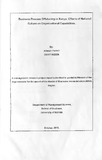| dc.description.abstract | As companies strive to become globally competitive, part of the strategy they
adopt is to offshore-outsource. Off-shoring has therefore become a business
imperative leading companies to look beyond the cost advantage. This new
paradigm provides opportunities for emerging markets to become off-shoring
destinations. Developing nations like Kenya have a chance to participate in
global sourcing. This study seeks to explain how national culture influences the
competitiveness of off-shoring firms in the context of Kenya.
A mixed-method research design underpinned by critical realism assumptions
was used. A case study and a survey were conducted. The analysis was
grounded on empirical results of the study, and employed theoretical thematic
analysis. Under the alienating factor conditions revolving around education, ICT
infrastructure, capital, stifling regulations, inadequate role of government, lack of
local demand and inadequate intercultural competence, the trajectory of BPO
development in Kenya shows promise but requires change of tact.
A myriad of challenges need to be overcome. In Kenya the government’s focus
on BPO and the ICT sector generally points to the potential of IT off-shoring in the
country. Indeed, the potential for Kenya exists but as the study finds out,
enhancing the potential calls for efforts and strategies for overcoming the
challenges.
From the analysis, and in line with Critical Realist approaches, this study
recommends a framework that can be employed to enhance the competitiveness
of BPO firms within their countries. Dubbed the RCS (Renewal, Credibility &
Sensitivity) framework, the critical dimensions revolve around the need for BPO
firms enhance their capabilities through organizational renewal; countries to
enhance their competitiveness through development of their national credibility;
while global stakeholders should recognize that there is a need for development of intercultural sensitivity, not only from vendor perspectives, but also from client
organizations.
The framework recognizes that the key drivers that underlie the development of
off-shoring success include the need to build organizational capability, positive
convergence of country factor conditions for enhancing competitiveness and
enhancing intercultural competence. | en |

